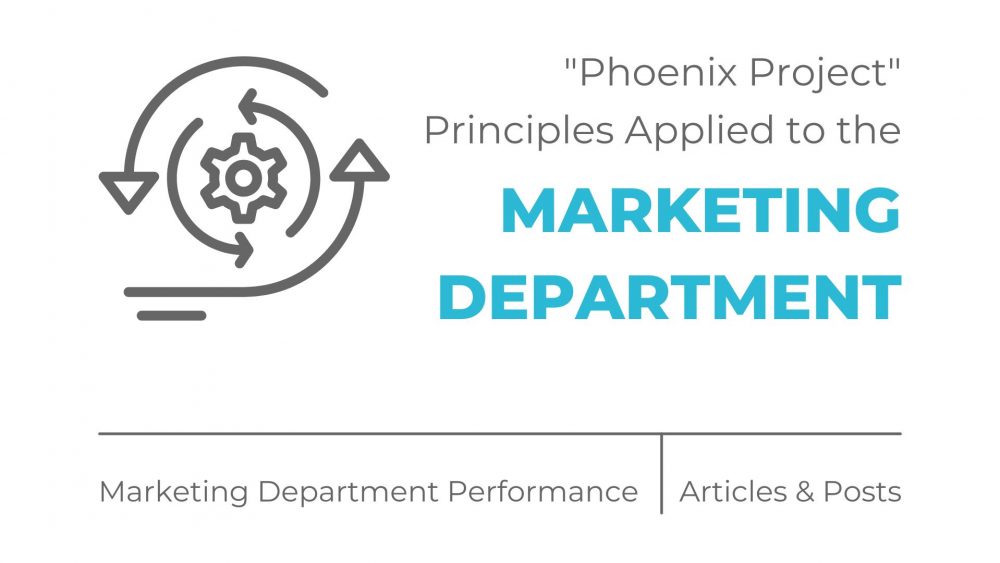Done any interesting reading lately?
We’ve read “The Phoenix Project” and learned some helpful principles that can help up continually improving our performance in the marketing department.
So let’s get going.
We’re about to go on a little literary journey.
You may be thinking, “The Phoenix Project? Isn’t that a book about IT?”
Well, yes, you’re not wrong there.
But, trust us on this one, it’s about as relevant to marketing as a trending hashtag or the latest SEO algorithm.
The principles in this book are not just for the tech nerds.
They’re universal.
And, they’re about to make us not just good, but great marketers.
So, let’s dive into this treasure trove and discover how we can rise like a Phoenix from the ashes of mediocre marketing.
Systems Thinking
A way of looking at things from a big picture perspective.
It’s about understanding and managing how different parts and forces are connected and work together, rather than just focusing on individual pieces.
The concept of understanding how different parts of the marketing department work together, and more importantly how they impact other departments in the company is an invaluable step towards success.
Rather than existing as its own isolated entity, the marketing department is both affected by and affects other departments in the organization.
By using systems thinking, you can make the most of your internal resources to better strengthen and diversify your overall goals – both as a department and as a company.
As a result, you will be able to gain greater clarity on where your marketing efforts are best spent and achieve maximum results with minimal expenditure of energy and resources.
You’ll also be able to pinpoint areas in your systems that are broken, whether internally or in your cooperation with other departments.
Once you know where something is broken, then you can take the steps to mend the system, and you will not have to deal with the same issues again.
Amplify Feedback Loops
Using data to improve marketing campaigns and strategies.
Understanding how to use data effectively is crucial for successful marketing.
By enhancing feedback loops, we can maximize its impact and power.
As outlined in the book “The Phoenix Project,” improving feedback loops means:
- using data through rapid experimentation and learning
- scoping small at first, running tests
- and making adjustments on the go.
All with a focus on continuous improvement.
Doing so has the potential to dramatically reduce costs while increasing desired results of marketing campaigns and strategies, ultimately leading to an improved bottom line.
The opposite is that you don’t see results on a project for months – when it’s too late.
Your product has already hit the market and you can’t undo what you’ve already put into production.
Make sure you refine your current systems to allow quick turnaround and quick feedback on your successes and failures.
The sooner you know, the sooner you can implement changes, and the more efficient and effective your team becomes.
Experimentation and Learning
Trying new things and seeing what works best for the company.
Experimentation and learning is an exciting process that is the key to innovation and success in your marketing department.
And when it is shut down, it really kills growth, as exemplified in “The Phoenix Project”.
To remain ahead of the curve, marketing teams must strive to experiment and learn from those experiments in order to grow, by using those feedback loops talked about earlier.
Make it a point to constantly test out new approaches, analyze consumer trends, keep tabs on metrics, and alter your plans based on what you and your team have observed.
Implementing this type of methodology sets you up for success now as well as into the future.
Don’t shut out something new just because it hasn’t been done before.
Give it a shot.
If it can work towards the purpose of your marketing department, it’s worth trying.
If you have great feedback loops in place, you’ll know quickly if it doesn’t work, or if changes need to be made.
And that’s where the innovation and growth starts to snowball, and you can get amazing results out of something that started off as an unknown.
Culture of Continuous Improvement
Always looking for ways to improve the marketing department’s performance as a culture and team.
“Continuous improvement” is more than just a catchphrase for a marketing department or any department – it is an essential element of your team’s culture.
If you have a culture of continuous improvement, your team – that’s right, you’re a team! – is always striving to be better, to do more, and to achieve bigger goals with each passing day.
You can use the principles discussed from the book “The Phoenix Project” to accelerate this progress – leveraging systems thinking in order to create amplifying feedback loops and an openness to experimentation and learning.
Commitment to a culture of continuous improvement, will result in seeking excellence through inspiring creativity and innovation.
You can build this by:
- making sure everyone knows their objectives
- providing regular feedback on progress made in order to keep motivation high
- and recognizing hard work whenever possible.
In a Nutshell
In essence, the Phoenix Project’s principles transcend the boundaries of IT, offering a comprehensive framework beneficial to diverse fields including marketing.
By applying these concepts, we have the ability to elevate our marketing efforts beyond their current limitations and achieve remarkable results.
Get your marketing department members of a to understand systems thinking, amplify feedback loops, embrace experimentation and learning, and foster a culture of continuous improvement.
Then you will set yourself and your company up to thrive in today’s fast-paced business world.


Comments are closed.